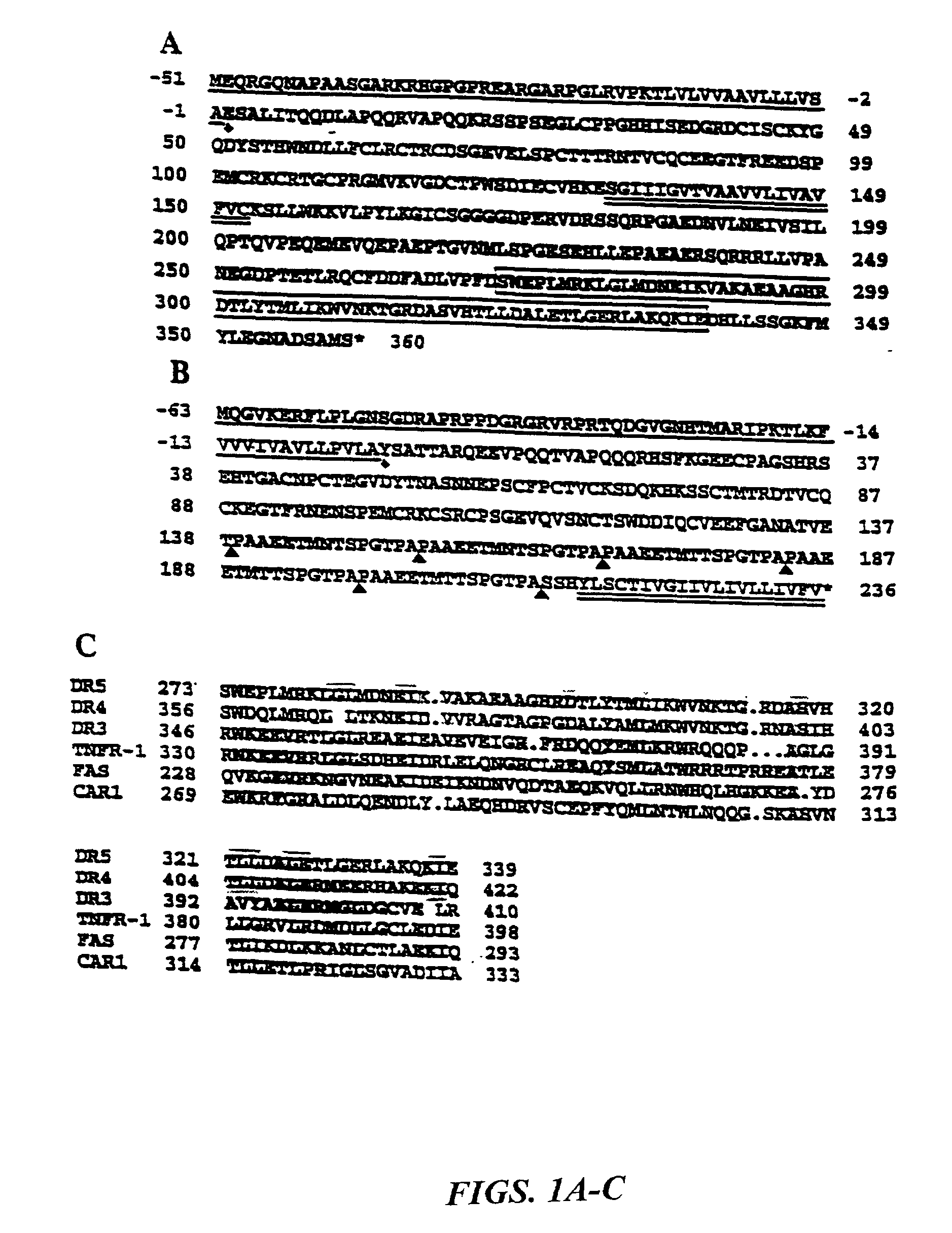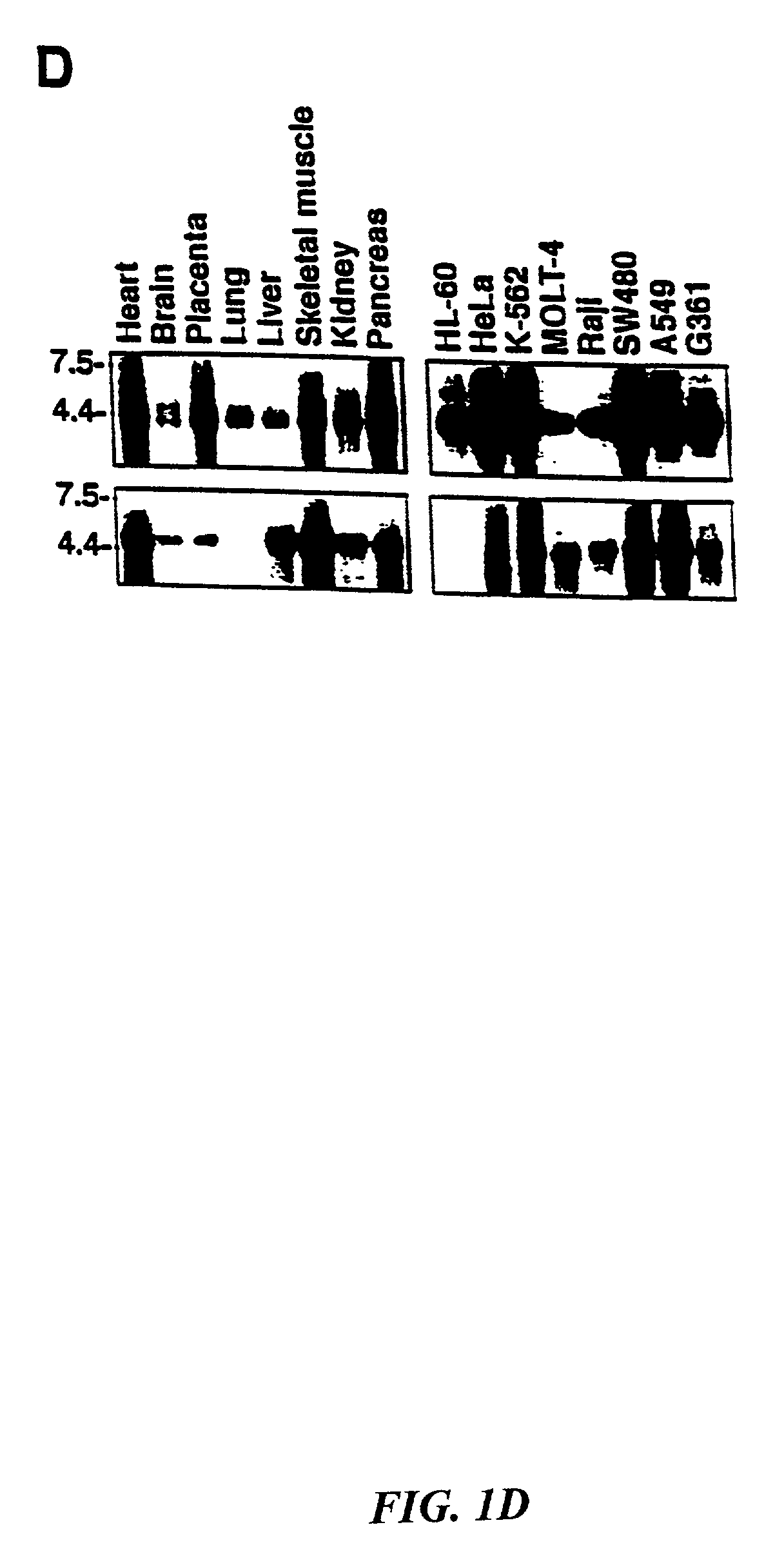Trail receptors, nucleic acids encoding the same, and methods of use thereof
a technology of nucleic acids and receptors, applied in the field of trail receptors and nucleic acids encoding the same, can solve the problem of unclear physiological control mechanisms that regulate this form of programmed cell death
- Summary
- Abstract
- Description
- Claims
- Application Information
AI Technical Summary
Benefits of technology
Problems solved by technology
Method used
Image
Examples
examples
[0139] Unless otherwise stated, the present invention was performed using standard procedures, as described, for example in Maniatis et al., Molecular Cloning: A Laboratory Manual, Cold Spring Harbor Laboratory Press, Cold Spring Harbor, N.Y., USA (1982); Sambrook et al., Molecular Cloning: A Laboratory Manual (2 ed.), Cold Spring Harbor Laboratory Press, Cold Spring Harbor, N.Y., USA (1989); Davis et al., Basic Methods in Molecular Biology, Elsevier Science Publishing, Inc., New York, USA (1986); or Methods in Enzymology: Guide to Molecular Cloning Techniques Vol 152, S. L. Berger and A. R. Kimmerl Eds., Academic Press Inc., San Diego, USA (1987).
example i
Cloning and Characterization of DR5 and TRAIL-R3
[0140] This example demonstrates the identification and cloning of DR5 and TRAIL-R3 cDNA. Briefly, several EST clones were identified and their 3' and 5' sequences were compiled. Based on the compiled sequences, PCR primers were generated and used to clone two cDNAs which encode two novel members of the TRAIL-receptor family (FIGS. 1A and 1B).
[0141] To identify novel members of the TNF-receptor family, an approach combining information from the GenBank database of human expressed sequence tags (ESTs) and PCR was employed (see Alnemri E. S. et al. (1996) Proc. Natl. Sci. USA. 93, 7464-7469; Fernandez-Alnemri et al., Cancer Res. 5S:2737-2742 (1995); and Fernandez-Alnemri et al., Cancer Res. 55:6045-6052 (1995)). Initially, a search of the GenBank EST data base for sequences related to TRAIL receptor-1, also referred to as "DR4", identified several EST clones, which were used to derive 5' and 3' PCR primers to clone related cDNAs.
[0142] T...
example ii
Expression Analyst. of DR5 and TRAIL-R3 mRNA
[0150] This example demonstrates the mRNA expression patterns of DR5 and TRAIL-R3 in normal and tumor cells.
[0151] FIG. 1D shows a Northern blot analysis of the expression of DR5 (upper panels) and TRAIL-R3 (lower panels) mRNAs in normal tissues and tumor cell lines. X-ray film exposure time in the two lower panels and the upper left panel was for 48 hours, whereas in the upper right panel was for 2 hours. The cell lines assayed were: HL-60, promyelocytic leukemia; HeLa cell S3, K-562, chronic myelogenous leukemia; MOLT-4, lymphoblastic leukemia; Raji, Burkitt's lymphoma; SW480, colorectal adenocarcinoma; A549, lung carcinoma; G361, melanoma. Numbers on the right in FIG. 1D indicate kilobases.
[0152] Northern blot analysis of equivalent amounts of mRNA samples from normal human tissues and tumor cell lines, with a DR5 riboprobe, detected a .about.4 kb transcript in all the samples (FIG. 1D, upper panels). Surprisingly, the amount of DR5 tra...
PUM
 Login to View More
Login to View More Abstract
Description
Claims
Application Information
 Login to View More
Login to View More - R&D
- Intellectual Property
- Life Sciences
- Materials
- Tech Scout
- Unparalleled Data Quality
- Higher Quality Content
- 60% Fewer Hallucinations
Browse by: Latest US Patents, China's latest patents, Technical Efficacy Thesaurus, Application Domain, Technology Topic, Popular Technical Reports.
© 2025 PatSnap. All rights reserved.Legal|Privacy policy|Modern Slavery Act Transparency Statement|Sitemap|About US| Contact US: help@patsnap.com



